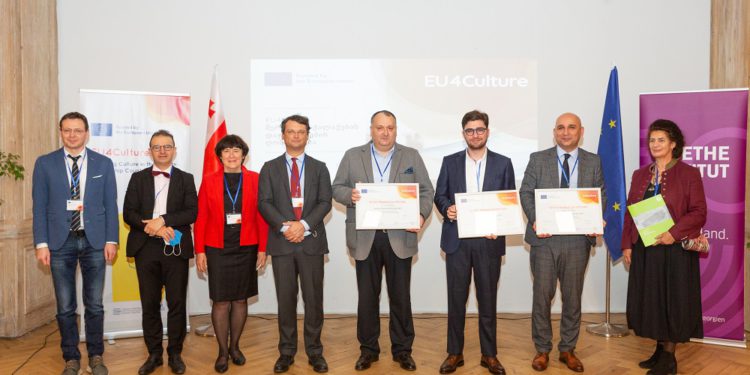Within the framework of the EU-funded project EU4Culture, Kutaisi, Poti and Zugdidi will receive grants of up to 30 000 € to prepare city Cultural Development strategies.
On December 1, the project organized a city award ceremony in Tbilisi. At the event, Catalin Gherman, Deputy Head of Cooperation of the EU Delegation to Georgia and project partners awarded grant certificates to mayors and city representatives from Kutaisi, Poti and Zugdidi. From December 1, the cities will start working on their strategies.
The call for applications was launched in May 2021. It aims to support non-capital cities and towns to develop and implement Cultural Development Strategies, following the approach of the European Capitals of Culture. Overall, 70 cities from 5 Eastern Partnership countries participated in the call.
Selected cities will receive up to 30 000 € grants to develop the Cultural Development Strategies. At the final stage of the call, one of the cities will be awarded a grant of up to €300,000 to implement its strategy. In addition to grants, the project will provide capacity-building support to cities.
“We are pleased that with the EU support under the EU4Culture program, Kutaisi, Poti and Zugdidi will start to work for the first time on Cultural Development Strategies of their cities. This is a major opportunity for these cities to further explore the potential of their cultural and creative sectors and then implement actions that will make positive changes for their communities and beyond. The EU attaches great importance to culture as a key element conducive to sustainable development and economic growth of cities, particularly relevant for their recovery in the context of the pandemic,” Noted Catalin Gherman, Deputy Head of Cooperation of the EU Delegation to Georgia
EU4Culture is a four-year project funded by the European Union to support culture and creative sector with a special focus on non-capital cities and towns in the Eastern Partnership Countries. The project is implemented by the Goethe Institut (lead), Institut Francais Georgie, Danish Cultural Institute, Czech Centers.














